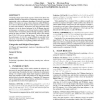Free Online Productivity Tools
i2Speak
i2Symbol
i2OCR
iTex2Img
iWeb2Print
iWeb2Shot
i2Type
iPdf2Split
iPdf2Merge
i2Bopomofo
i2Arabic
i2Style
i2Image
i2PDF
iLatex2Rtf
Sci2ools
172
click to vote
GECCO
2011
Springer
2011
Springer
Collisions are helpful for computing unique input-output sequences
Computing unique input-output sequences (UIOs) from finite state machines (FSMs) is important for conformance testing in software engineering, where evolutionary algorithms (EAs) have been found helpful. Previously, by using a fitness function called W-fitness, (1+1)-EA was theoretically shown to be superior to random search on some FSM instances. Motivated by the observation that many plateaus exist in the fitness landscape of the W-fitness function, in this paper, we propose a new fitness function called C-fitness which is able to override the plateaus through exploiting collisions among the states of FSMs. We theoretically analyze the running time of (1+1)-EA on two problem classes. Our results show that the performance of (1+1)-EA using C-fitness is generally better and never worse than that using W-fitness in our studied cases, implying the importance of exploiting problem structures. Categories and Subject Descriptors F.2 [Theory of Computation]: Analysis of Algorithms ...
Related Content
| Added | 28 Aug 2011 |
| Updated | 28 Aug 2011 |
| Type | Journal |
| Year | 2011 |
| Where | GECCO |
| Authors | Chao Qian, Yang Yu, Zhi-Hua Zhou |
Comments (0)

